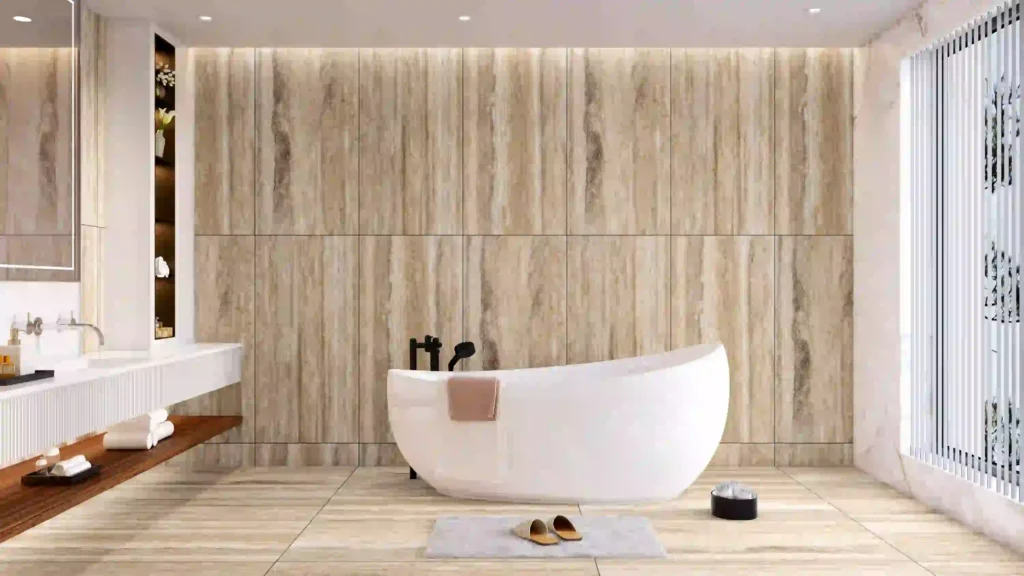Tree Tile is going through a wonderful transition as it embraces sustainability and reduces its negative effects on the environment. There is a growing demand for eco-conscious methods in all industries, including tile manufacture, as awareness of the fragile balance of our planet rises. Let’s explore the fascinating realm of environmentally friendly tile manufacturing, where duty and beauty go hand in hand.
Raw Material Selection
We have careful selection of raw materials is the first step in the creation of sustainable tiles. In order to minimize resource depletion and reduce the need for new extraction, manufacturers prioritize employing recycled or reclaimed materials, such as post-consumer glass, ceramics, or industrial waste.
Reducing Pollution and Emissions
The goal of producing sustainable tiles is to produce as few emissions and pollutants as possible during the manufacturing process. This entails utilizing low-emission kilns, switching to cleaner production techniques, and making investments in equipment that collect and process pollutants from the air and water.
Creative Roots
Reusing materials such as glass, porcelain, and even cork minimizes waste by lowering the production’s environmental impact and dependency on virgin resources. Consider adding a glittering touch to your bathroom wall with recycled glass mosaics, where each piece narrates a creative tale.

Energy Efficiency
By utilizing renewable energy sources like solar power and biogas, modern kilns and drying processes can lessen their reliance on fossil fuels and greenhouse gas emissions. We are getting closer to a greener future with every tile burnt with renewable energy.
Conscientious Sourcing
Reducing environmental disturbances and promoting conscientious land management are achieved through the ethical procurement of raw materials from sustainably managed forests or locally extracted clay. Select environmentally friendly tiles to allow your walls to tell the tale of their ethical sourcing.
Innovation Becomes the Main Event
Green chemistry is the process of substituting non-toxic or plant-based chemicals for hazardous ones in glazes and adhesives to protect worker health and lessen environmental pollution. With each eco-friendly tile, we can all take a step toward a better earth.
Closed-Loop Systems
Ingenious producers are creating manufacturing procedures that reduce waste and make it possible to recover and reuse materials. Imagine a day in the future when tiles come back to life and are transformed into stunning new designs.
Bio-inspired Design
Since nature is the ultimate inventor, sustainable tile manufacture takes cues from its knowledge. The possibilities are infinite, ranging from bio-based materials like mycelium to self-cleaning surfaces that mimic lotus leaves.
Local procuring and Community Impact
In an effort to lower carbon emissions associated with transportation, manufacturers are placing more emphasis on procuring materials locally. Furthermore, social projects in the areas where manufacturing occurs, fair labour standards, and community involvement are all important components of sustainable tile production.
Education and Transparency
A focus on transparency helps to promote the development of ethical and sustainable tiles. Producers are opening up more about how they operate, telling customers about how their goods affect the environment, and giving them the knowledge they need to make wise decisions.
Lifecycle Considerations
The complete lifecycle of the product is taken into account during the creation of sustainable tiles. To reduce waste, this entails designing tiles with lifespan in mind, promoting longevity, and taking end-of-life choices like recycling or repurposing into account.
Beyond Production
Lifespan Matters: Choosing long-lasting, premium tiles lowers the overall resource usage and minimizes the need for replacements. Select durability, and your tiles will remain cherished features in your room for many decades to come.
When the time comes, make an informed decision about how to dispose of things responsibly by recycling or repurposing demolition debris. For the ecosystem, every tile that is given another chance is a success.
Packaging Sustainability
Creating sustainable tiles involves more than just the manufacturing process; it also involves using environmentally acceptable packaging. A more sustainable approach is achieved by the use of recycled materials, the design of easily recyclable packaging, and minimalist packaging.
Conclusion
Sustainable tile production is an essential transition towards a future that is more environmentally conscious and responsible than it is a passing fad. Each tile made with mindfulness signifies a step toward a society in which responsibility and beauty coexist. Choose environmentally friendly tiles, honour their history, and help your area lead the way toward a more sustainable future.




